By Logan Michael
A sterile, narrowing hallway united by a small, humble door frame was all that separated me from a horror I couldn’t imagine.
A horror I could only meet in the headlines, the textbooks, and the anecdotes of inspiring figures. A horror I, as a white homegrown American citizen, could never imagine.
On March 27, 2025, the Israeli Defense Forces came to the University of North Florida.
Since October 7, 2023, the state of Israel has accelerated its genocide of Palestinians through repetitive bombing campaigns, leading to the deaths of at least 50,000 Palestinians, all orchestrated by the strategic military operations of the Israeli Defense Forces.
Agents from this very military force came to the UNF campus with the intent to garner support and spread propaganda for Israel’s genocide—an operation necessary for Israel, as their military campaigns are in large part funded and given international credibility by the United States.
I, as part of a band of Jacksonville student advocates and community members, took part in a demonstration on UNF campus with the intent to disrupt the event.
Student advocacy like this is pretty formulaic: show up, demonstrate opposition to the genocidal agents with chants from a dozen folks, the cops tell you to leave, and you do just that.
This time around, however, the pigs in uniform didn’t follow script. As chants of condemnation filled the room, campus police surrounded us, informing a lead organizer that we had to evacuate the premises.
Like clockwork, we began to leave the room and exit the building, as we were told, until something changed. As I reached for the door’s crash bar, my hand was quickly swatted away to make room for an officer’s arm, barricading my torso from the doorway.
“You’re being detained and trespassed from the premises,” a UNF officer told me, matter-of-factly.
In a matter of moments, our right to free speech and peaceful protest was upended. What was supposed to be a typical demonstration instead turned into a constitutional alarm.
Since the beginning of the second Trump Administration—what some have been rather melodramatically calling the end of American democracy as we know it—we’ve seen an unprecedented rise in student suppression by campus police, with international students bearing the biggest brunt.
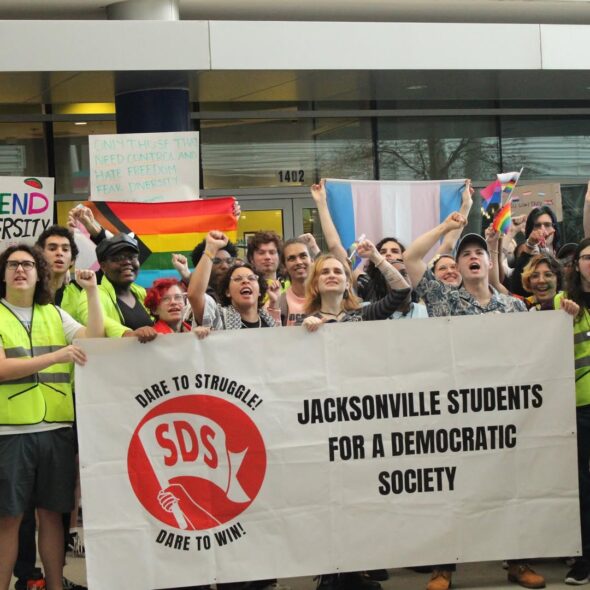
Upwards of 1,000 international students have had their visas or legal statuses quietly revoked across the country, with Inside Higher Ed tracking at least 18 of these revocations to Florida universities, many targeting student activists in particular.
Mahmoud Khalil, an international graduate student from Columbia University who engaged in pro-Palestinian student protests, was detained by ICE officials without due process and was promptly sent to an ICE detention facility in Louisiana, now awaiting the courts to determine the constitutionality of his detention.
As of writing, Khalil remains detained and has missed the birth of his son.
While Khalil’s case may seem extreme and tied to the incendiary politics of Columbia University’s encampment movement, the governmental repression Khalil has faced is anything but isolated and should scare all of us—the Sunshine State is no different.
Under the direction and applause of Gov. DeSantis, Florida has taken up extreme measures to comply with the Trump regime.
Just this past February, all 67 counties in Florida signed onto the now widespread 287(g) program, allowing local law enforcement to engage in immigration enforcement. Essentially, across Florida, every cop you see is also an ICE agent. Spooky.
Policies like these have clear consequences.
Felipe Velázquez, an international student from the University of Florida, was promptly detained by ICE at a traffic stop in Gainesville, shipped off to an ICE detention facility in Miami-Dade County, and then promptly deported to Colombia without due process.
Velázquez, unlike Khalil, wasn’t an incessant political advocate. Under no circumstances could the Trump regime have argued Velázquez was a threat to national security as grounds for deportation, as they did for Khalil.
Instead, Velázquez was simply deported, and that’s the end of the story.
This isn’t to say Velázquez’s case wasn’t substantial; it was. Velázquez demonstrated that the Trump regime, especially in states like ours—where the governor is bent on cooperation with the fascist administration—is simply able to disappear any non-citizen without consequence or reasoning, regardless of where the detainee stands politically.
Such a revelation should be electrifying the public, considering Trump has expressed repeated interest in detaining and deporting American citizens to the infamous CECOT prison in El Salvador.
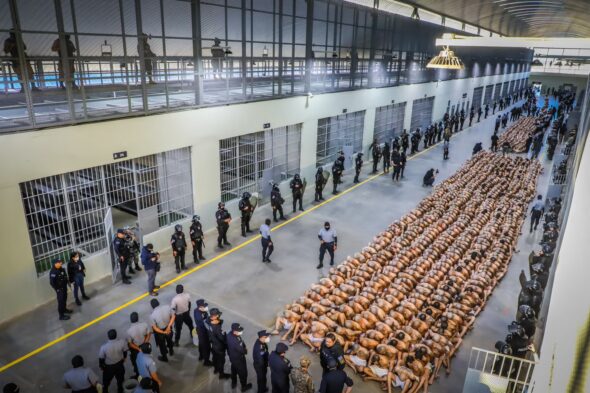
If speech is grounds for detention without due process, and if a traffic stop is suitable for immediate detention in another county, and if it remains legally permissible to be abducted off of the street in broad daylight like Rumeysa Ozturk, and if citizens aren’t exempt from such constitutionally forbidden treatment, then we’ve got a problem—a fascism problem.
With the most prestigious Fascism scholars fleeing the United States out of fear, it’s slowly becoming harder to ignore the alarm bells that everyone seems to be ringing. If fascism really is here, and the liberal democracy of America has been supplanted, and the rule of law is over, and the separation of powers has been done away with, what do we do?
Do we roll over and accept it? Do we follow suit and leave the country? Do we await our paid-in-full vacations to El Salvador? No, not quite.
Resistance under a fascist regime may feel impossible, but it’s not. It’s just going to look a whole of a lot different, and it’s better we start thinking about it now while the bells are still ringing.
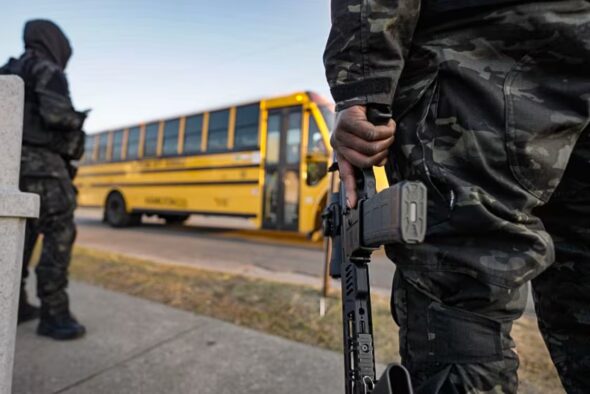
Just this past March, in response to a neo-Nazi rally held nearby, a predominantly black neighborhood in Ohio formed a militant civilian defense force in order to protect its inhabitants and children from racist violence.
Initiatives like this echo the efforts of the former Black Panther Party and their staple ‘cop watch’ programs, where armed civilian guards would open carry within black communities while watching for police activity in order to protect their black and brown residents.
Programs like these, where the community comes together in order to replace state infrastructure with simple, everyday citizens, are vital.
To this end, the Black Panther Party (BPP) provided much more than just community self-defense.
The BPP held free-lunch programs for upwards of 20,000 students around the country, distributed clothing to poor folk, aided in transportation, and even operated small-scale health clinics.
All of these programs necessary for survival were provided free of charge by members of each local community. If the government wouldn’t provide for poor black folk, the people would—and they did it well.
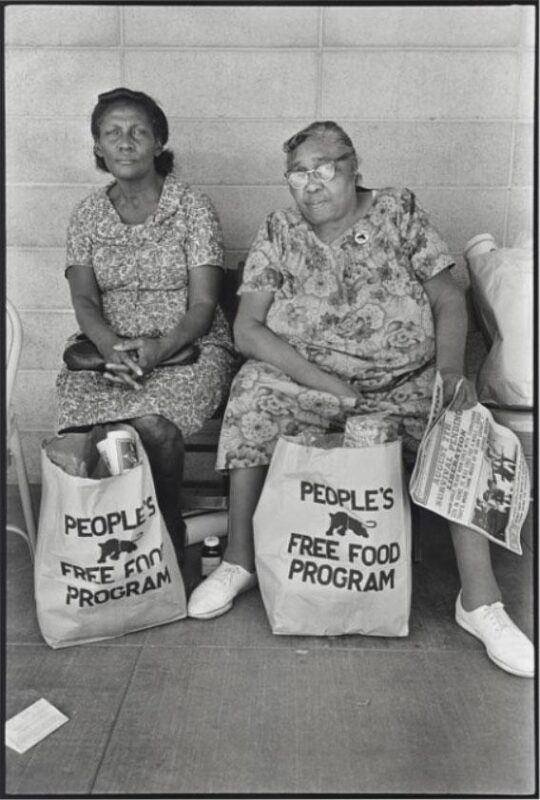
As the Trump Administration continues to test the legal boundaries of deportation, and as the scope of immigration enforcement expands into the jurisdiction of local law enforcement, we’ve got to start reevaluating our best ways at fighting back, and we’ve got to do it now.
Protests and marches only do so much, and our officials don’t seem to pick up the phone anymore. If we want to get serious about making change, we’ve got to start where it counts: the community.
Initiatives and programs like the Ohio militia and the Black Panther Party’s community aid were so impactful because they filled a vacancy.
The government failed to account for centuries of economic inequality and systemic disenfranchisement of the black community, and the police only seemed to be on the offensive; it made sense why the BPP figured it was up to them and them alone– because it really was.
By filling that power vacuum and providing for their community, the Black Panther Party managed to grow from a couple political college students with a dream, into a nationwide network of resistance eliciting federal attention, culminating in the assassination of Black Panther Fred Hampton in a joint operation between the Chicago Police Department and the FBI.
If the FBI gets involved in shutting down your food bank, you’re clearly doing something right.
If political resistance is to be effective, and if immigrants and racially marginalized communities are to remain safe from political repression and deportation, and if poor working-class Americans are to keep putting food on the table, it’s up to us, not the government. We have to organize.
It’s in our best interest, not only to continue resisting the current regime, but to look after each other, put aside our differences, and ensure the survival of ourselves and our neighbors.
We can only do it together.

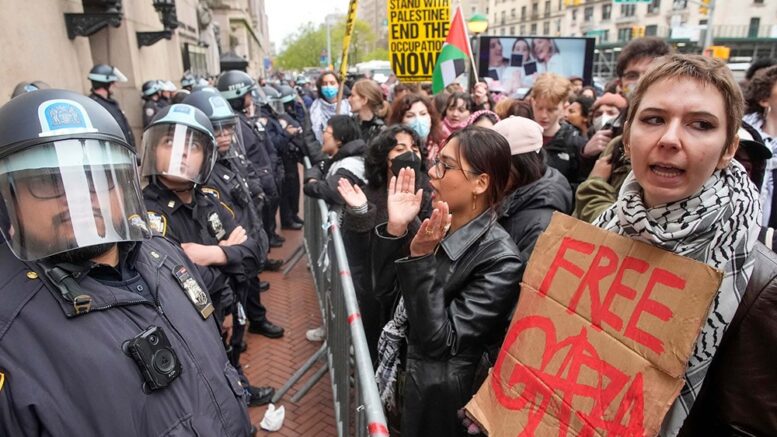


Be the first to comment on "Freedom Under Fire: Campus Protest Suppression and our Fascist Future"